The muscle under the jaw on the left hurts. If the jaw and ear area hurts - when it hurts to chew and yawn
When you open your mouth, you should immediately contact a dentist, neurologist or surgeon. Only experienced specialists after a personal examination will tell you why this phenomenon worries you. But if you can’t visit the hospital soon, then below we will present some of the most probable causes why the jaw hurts, and how to eliminate discomfort.
Arteritis of the facial artery
This disease is characterized by damage to the artery located in the jaw. Symptoms of this deviation are a strong burning sensation that extends from the chin to the lip and nose.
Disorders in the functions of the temporomandibular joint
This deviation can be preceded by both malocclusion and inflammatory process in this area of the face. Among other things, the reasons that the jaw hurts when you open your mouth can be:
- cranial neuralgia;
- neuralgia of the glossopharyngeal nerve;
- neuralgia of the laryngeal nerve (upper);
- neuralgia of the ear node;
- carotidinia (a special kind of migraine);
- osteogenic sarcoma (or malignant tumor).
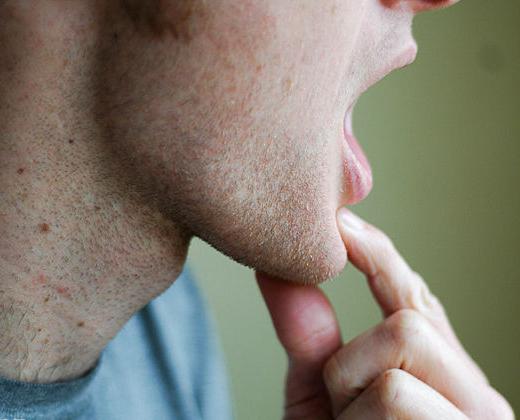 What to do if your jaw hurts?
What to do if your jaw hurts?
To determine why such a phenomenon began to bother you, you must personally visit a specialist. And only after the diagnosis is made, you will be prescribed a course of treatment, as well as physiotherapy. But if you can’t get to the hospital in the coming days, then you should follow the recommendations described below to ensure complete rest for your mandibular joint:
- Try not to open your mouth too wide. In this case, food should be taken with a dessert spoon. Food should be mushy.
- Try to refrain from yawning.
- Limit yourself to only those chewing movements that are necessary for eating.
Sometimes a person is overtaken by a very unpleasant feeling - pain in the jaw. It hurts when you open your mouth, chew and talk. There is pain under the jaw or in upper jaw, on the right side or on the left, sometimes only the joint hurts, and sometimes the whole mouth. To answer the question why the jaw hurts, a dentist, surgeon or neurologist will help you. But which one should you contact in your situation?
Causes of jaw pain
The fact is that pain in the jaw can have many different causes, it is on them that the choice of a doctor and, accordingly, treatment depends.
Jaw injuries
If your jaw hurts, it means that you cannot speak, eat, sleep normally. The cause of this problem should be sought as soon as possible, as there is a possibility of dangerous complications.
Injury
Injury only damages soft tissues jaws. There is pain, slight swelling, bruising, but these symptoms are not strong, it does not hurt to open the mouth, the patient fully recovers in 2-3 days. What to do in case of injury? It is most effective to use a cold compress and a special diet that will help keep the jaw at rest.
There can be many reasons for jaw pain. Get ready for examinations with doctors of various medical specialties.
Dislocation
It happens when you open your mouth. It can happen if a person opens a bottle or hard packaging with his teeth. In addition, dislocation threatens people with joint diseases.
When a dislocation occurs in a person, the mouth is fixed in an open position, the jaw is beveled on the right or left side, saliva flows out of the mouth (since there is no way to swallow it). The doctor of the emergency room sets the dislocation manually.
fracture
In the event of a mechanical injury (for example, as a result of an accident), a person may have a fracture of the upper or mandible. With a particularly strong impact on the human skull, a fracture of both jaws often occurs at once. The degree of complexity of the fracture depends on whether it is multiple or single, open or closed, and whether displacement is present.

A broken jaw is a terrible thing, and its treatment is an unpleasant business.
Fracture symptoms (other than pain): difficulty chewing, swelling, bruising. Of course, it is carried out exclusively by a doctor. With early admission to the hospital, full recovery will take no more than one month. Except medical treatment, enough attention should be paid to patient care: rinse his mouth with warm water with antiseptic and give processed food.
Osteomyelitis of the jaws
If the pain in the jaw has a pulsating character, it is added to headache and heat, then it is likely that you have osteomyelitis of the jaws. This is special infection jaw bones, which causes severe inflammation.
The main cause of this disease is an infected tooth, and the doctor makes a diagnosis based on this very tooth (it staggers, it hurts a lot, especially when tapped), x-ray(it will show how many teeth are already infected) and general analysis blood.
Alas, the removal of infected teeth in osteomyelitis is a necessity. In addition, treatment includes a course of antibiotics and general detoxification of the body.
Please note that osteomyelitis of the upper jaw is especially dangerous and can cause serious complications. That is why, with soreness in the upper jaw, you should consult a doctor immediately.
Pain of neurological origin
Trigeminal neuralgia - this nerve is responsible for connecting our entire face with the central nervous system. When the trigeminal nerve is affected, pain radiates to the jaw. This pain can be characterized as boring or burning, moreover, it comes on in attacks and most often at night. As a rule, the jaw hurts only on one side and never hurts from the back.
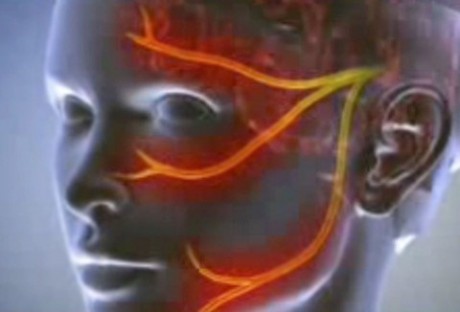
The trigeminal nerve, the malfunction of which can cause pain in the jaw.
Neuralgia of the superior laryngeal nerve - in this case, quite severe pain occurs under the jaw (on the right or left side) when chewing, yawning, blowing your nose. Very often, the pain is accompanied by salivation, coughing, hiccups.
Neuralgia of the glossopharyngeal nerve is a very rare disease, it is characterized by pain in the tongue, which turns into soreness under the jaw, in the lower jaw in the larynx, chest. It is aggravated by movements of the tongue, chewing and talking, the attack of pain lasts about three minutes.
The treatment of all pain in the jaws caused by the pathology of the nerves is carried out by medication, and only if it is ineffective, the nerve is surgically suppressed.
Wisdom teeth
One of the most common causes of jaw pain is cutting wisdom teeth. As a rule, such pain increases when opening the mouth. What to do in this situation? You have three options:
- go to the dentist, he will make a small incision and this will help the teeth grow easier, and if the wisdom tooth has grown, the doctor will remove it;
- take a strong pain reliever, for example, Dexalgin - often such drugs relieve not only pain, but also inflammation;
- use folk remedies, rinse your mouth with sage, it will not bring harm.
But not only wisdom teeth can cause jaw pain. Soreness under the jaw or in the jaw itself occurs when you have a tooth decay, flux or abscess. An abscess under a tooth can be enough reason for it to hurt you to open and close your mouth, eat and talk.
Arteritis of the facial artery
If you feel a burning pain under the jaw that extends to upper lip, nose or even the corners of the eyes, then there is a possibility that you have arteritis of the facial artery. In fact, arteritis is an inflammation of the artery wall, respectively, the treatment of this disease is associated with the suppression of inflammation in the arteries.
Dysfunction of the temporomandibular joint
In this case, it can hurt not only in the joint itself, but also in the temple, cheek and even in the forehead. The pain intensifies when opening the mouth, and with each movement a click is heard.

A striking sign of a violation in the work of the temporomandibular joint is a click when the jaws open.
The fact is that there are many reasons for dysfunction of the temporomandibular joint (from malocclusion to osteoarthritis of the joint). Therefore, you cannot self-medicate, and if you are sure that the pain is associated with the joint, then go to the doctor: he will determine the cause and prescribe the appropriate treatment.
Carotidynia
Carotidinia is a type of migraine. The pain occurs suddenly, is concentrated in the upper jaw (both on the right side and on the left side).
Various reasons can cause carotidynia. For example, it can be caused by a damaged tooth, inflammation in the sinuses, or the same lesion of the trigeminal nerve, which was discussed above. Treatment is prescribed by a doctor, but, as a rule, the most effective is the combination of indomethocin with antidepressants.
Pain while wearing braces
Why does my jaw hurt so much while wearing braces? Pain and slight looseness of the teeth in the first days after the installation of the bracket system is a sign that the brackets are installed correctly, the process of teeth displacement and bite formation occurs. In this case, you don't need to do anything.
But if the pain in the jaw and the inability to open the mouth normally are caused by malocclusion, then you should immediately contact the orthodontist.
Good afternoon, dear subscribers! Today we will talk about the problem of the jaw muscles - when either the muscle itself hurts, or it gives into the ears, or it pulls under the jaw. I will also look at the problem of trigeminal inflammation briefly.
If it happened that it suddenly hurts you to yawn and chew food, the pain radiates to your ears, then with a high degree of probability it can be argued that you have dysfunction of the temporomandibular joint (ANS). This problem is being treated, so you should not get discouraged, but you will need to keep your mouth shut for some time!
A bit of anatomy
The lower jaw is attached to the skull through the muscles and ligaments of the temporomandibular joints. When you begin to experience jaw pain when chewing and yawning, your body is signaling that your jaw muscles are inflamed and spasmodic. Therefore, by the way, the pain can give in the ear.
It is the lower jaw that can hurt, both on the right and on the left side. Sometimes on both sides at once, but most often on one side. At the end of the jaw, where the muscles are, passing into the temporal region. Unpleasant sensations occur when you chew, when there is some kind of muscle activity.
Symptoms
The main symptoms of ANS are pain in the jaw joint - it is difficult to fully open the mouth, there are crunches or clicks when chewing and yawning. The pain can be given to the head, and to the temple, to the neck and shoulders.
Causes of pain
The main causes of ANS are emotional experiences that spasm the muscles of the jaw, this is in men. Sometimes, much less often, ANS is caused by arthritis, a jaw injury.
In women, problems with the temporomandibular joint come from an unfortunate position in a dream when they sleep, buried in a pillow, for example, or from chewing excessively hard food.
One reason could be a bad tooth. For example, when a wisdom tooth is cut, or when it began to deteriorate without erupting. This cannot be ruled out, so this factor must also be taken into account. And if such a violation is present, then in this case it is the teeth that need to be treated.
It may also be that it hurts in the ear, but gives it to the jaw. This is evidence of an ear cold, inflammation of the trigeminal nerve. In this case, it is necessary to deal with the ear, treat the ear area from the outside with warming ointments such as tiger balm, stars.
Optimally - a place behind the auricle, and temples in front of the ear, where the hair does not grow yet, in a word, the outer part around the ear can be gently smeared with a warming balm.
Test it on a small part of the skin to feel your reaction, and if the sensations are unpleasant - a rash or an allergy, then wash it off. Well, if the body has accepted, then apply boldly to the entire area and warm up the tissues.
If the pain is sharp, apply cold
If you have acute pain in the joints of the jaw, then I advise you to immediately apply ice to the focus of pain, or a chilled bottle of water from the refrigerator. A cold object will block the pain signals of the nerves coming from the receptors and the acute unpleasant sensation will disappear. This, of course, is not a cure, but it will relieve the initial pain. The duration of applying ice is 10 minutes.
If the pain is dull, aching, apply heat
If you are tormented by a stupid one, It's a dull pain ANS, then apply heat to it. This will increase blood flow to the jaw muscles and relax them. You can moisten a towel in hot, but not scalding water, wring it out, and then attach it to your jaw. The duration of applying heat is 20 minutes.
Relaxing jaw muscle massage
If the pain is tolerable, then proceed to a relaxing massage of the jaw muscles. This will improve blood flow, relax spasmodic tissues. Open your mouth as wide as possible, and then massage the area near the mandibular joints with circular movements of your fingers.
Continue massaging for 5-10 minutes and then move on to the neck. The muscles of the neck also affect the state of the ANS, massage the area of \u200b\u200bthe muscles on the sides of the neck.
Try to sit straight while working.
This is a hackneyed recommendation, but rarely followed by anyone. In offices and offices, all women, as a rule, sit stooped. So, when you sit leaning forward, the muscles of the back and neck are tense, and from them there is tension on the ANS. Day after day, month after month, the constant tension syndrome builds up and eventually makes itself felt with sudden pain.
Against grinding teeth in a dream
By the way, one of the causes of ANS inflammation is teeth grinding in a dream. To protect your jaw and teeth, buy boxing mouthguards, which athletes use to protect their teeth in the ring. This method is suitable for both adults and children who "like" to grind their teeth at night.
Avoid solid foods during treatment
I advise you to eat cereals, mashed soups, something soft and not requiring wide opening of the mouth. Nuts, crackers, fried meat, kebabs should be excluded from your diet for some time. Break the bread with your hands beforehand so as not to injure your mouth with a wide opening.
Calcium and magnesium for muscle relaxation
In the morning, I advise you to drink a glass of orange juice mixed with calcium (500 mg) and magnesium (250 mg) powders. The combined action of these minerals will help relieve muscle spasm.
If the lymph nodes under the jaw hurt
A slightly different specificity, if the lymph nodes under the jaw hurt. This is a signal of another problem and the muscles have nothing to do with it. But it’s easy to diagnose this - the lymph nodes themselves look and feel enlarged on palpation, with pressure on them, pain is felt. In this case, you need to visit an ENT doctor.
From home methods of help, you can apply soda compresses to the area below the lymph node. Per liter of warm water, a tablespoon of soda, moisten cotton fabric, squeeze a little and apply for half an hour. Do the procedure regularly, until the lymph node returns to normal.
conclusions
So, if it hurts to chew and yawn - your jaw hurts when you open it, then you have temporomandibular syndrome, which is treated with rest, pureed food and calcium-magnesium supplements.
By the way, I have a friend who regularly cracks his jaws, but nothing hurts him. This is a congenital syndrome that is not treated in any way. And if your clicking jaws do not cause discomfort, then you do not need to do anything.
If you want to know exactly what the situation is with your temporomandibular joint, then you can do an MRI of the TMJ and have a specialist's transcript on hand. This is necessary to jaw arthritis or some other complex inflammation.
Pain in the jaw when opening the mouth can cause both dental and many other diseases and malfunctions in the body. Depending on the localization of discomfort and their nature, the doctor will be able to make an accurate diagnosis and prescribe adequate treatment. Therefore, if discomfort occurs, it is necessary to go to an appointment with a therapist who will analyze the situation and refer you to a suitable specialist.
If you want to know why your jaw hurts when you open your mouth, read on. We will analyze all the main causes and ways to eliminate them.
The most popular reason. Pain may be associated with mechanical trauma. The most common type of injury is a bruise. With it, only soft tissues suffer, the bones remain intact.
On the face, in the place where the bruise occurred, edema and hematoma occur. Often, a bruise is characterized by severe pain that interferes with chewing food and normal diction when talking.
Usually, swelling and hematoma disappear within a week, but if the site of the bruise does not stop hurting, an x-ray should be taken to rule out the possibility of a bone fracture.
A fracture can be the result of a blow or injury to the jaw. This is a serious injury, accompanied by severe pain. Swelling appears at the site of the bruise, a bruise forms a little later. If there was a strong blow with a fracture of the lower jaw, then it is very painful for a person to open his mouth, he can neither open nor close it.
With a fracture of the upper jaw, a hematoma may appear under the eye. If the damage is very severe, blood or a yellowish liquid may come out of the ears.
In these cases, an urgent x-ray and examination by a surgeon are necessary. Treatment can only be surgical, in serious cases, hospitalization of the patient is necessary.
Also, mechanical injuries include dislocation of the lower jaw. The risk of such an injury is especially high in people with joint problems. The pain during dislocation is always very strong, even unbearable, in some situations loss of consciousness from pain shock is possible. In this case, the jaw is in an unnatural position, the patient cannot close his mouth and talk: it is either pushed forward or skewed to the side. For treatment, the surgeon first sets the joint, and then the patient is assigned an x-ray to determine the presence or absence of a bone fracture.

Dental pathologies
Pain in the jaw when chewing can be caused by a number of dental pathologies:
- These can be severe carious problems that destroy teeth. In their place, cavities appear, into which an infection or food can get, constantly irritating the exposed nerve endings.
- Perhaps this is pulpitis, which also destroys the tissues of the tooth and irritates the nerve endings.
- With inflammation of the periodontal tissues occurs.
- Complications after pulpitis and caries - inflammation bone tissue, osteomyelitis.
- Injuries of the teeth - dislocations, splits, fractures of the neck of the tooth.
- Pain in oral cavity can occur with gingivitis - the gums become inflamed, swollen. Pain is caused by food that irritates the diseased mucosa.
- After a tooth is removed, its socket may become inflamed. At the same time, it turns red, swells and causes discomfort when chewing food.
Caries Pulpitis Periodontitis Tooth dislocation Gingivitis Inflammation of the tooth socket
In the case when pain in the jaw joint is associated with dental problems, the most unpleasant sensations occur during sleep. Patients characterize them as pulsating, sharp, aching. They are also aggravated by eating too hot or cold food or drinks, by intensive chewing and by clenching the jaws.
Many dental pathologies can lead to the formation of a purulent process. Most often provoked bacterial infections, much less often the cause is the development of viruses or fungi.
Due to penetration into the wound or through the hair follicle, the infection can develop into a furuncle. Over time, the inflammatory process passes to the soft tissues located deeper, and a purulent focus is formed there. This type of inflammation prevents the patient from opening the jaw while chewing and speaking.
Osteomyelitis is a rather serious disease that requires urgent treatment, because the inflammatory process captures not only soft tissues, but also bones, in severe cases even Bone marrow. The cause of this disease is an infection that can penetrate both from the external environment and from those damaged by caries or. Rarely, but it happens that the infection is carried through the bloodstream. Symptoms of osteomyelitis are pain, fever, swollen lymph nodes, asymmetric swelling of the face, and a headache may appear.
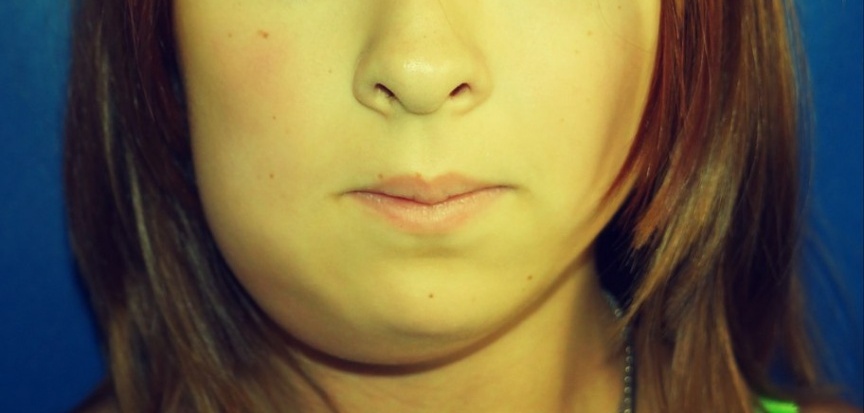
Phlegmon and abscess are characterized by the formation of pus, tissue swelling and severe pain. These diseases require immediate medical care. Their difference is that with phlegmon purulent process open, and with an abscess - closed. The patient has a high fever, headache and jaw. The process of swallowing is difficult, and the jaw is very difficult to open.
A complication of these ailments can be the spread of inflammation to new areas and tissue necrosis, which are a threat to the patient's life.
Neurological pain
Unbearable pain in the jaw occurs with neurological pathologies of its lower part. Particularly strong discomfort occurs with trigeminal neuralgia. In this case, the pain is sharp, aggravated at night, as a rule, its character is one-sided.
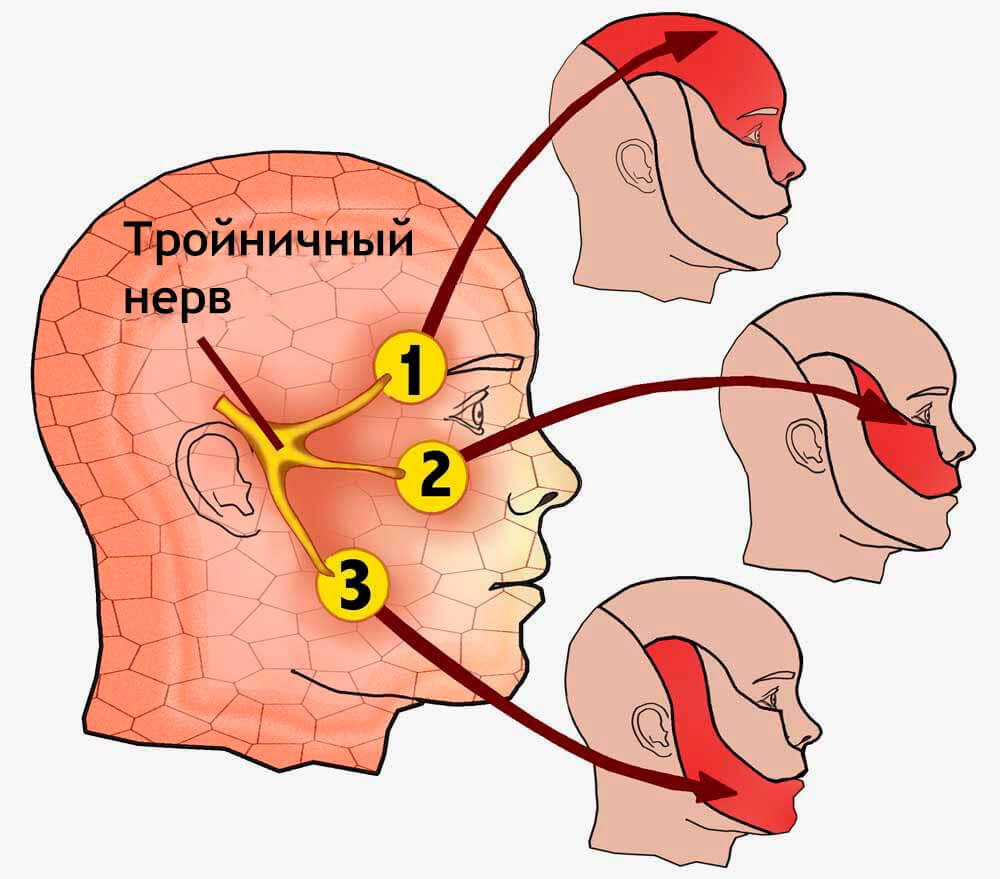
Severe pain when chewing and opening the mouth can be caused by problems with the upper laryngeal nerve, sometimes such pain is given to chest. Rarely, but still occurs inflammation of the glossopharyngeal nerve.
With neurological pain, painkillers and agents for stopping the inflammatory process are prescribed. In a number of particularly severe cases, surgical intervention is prescribed.
Neoplasms and vascular lesions
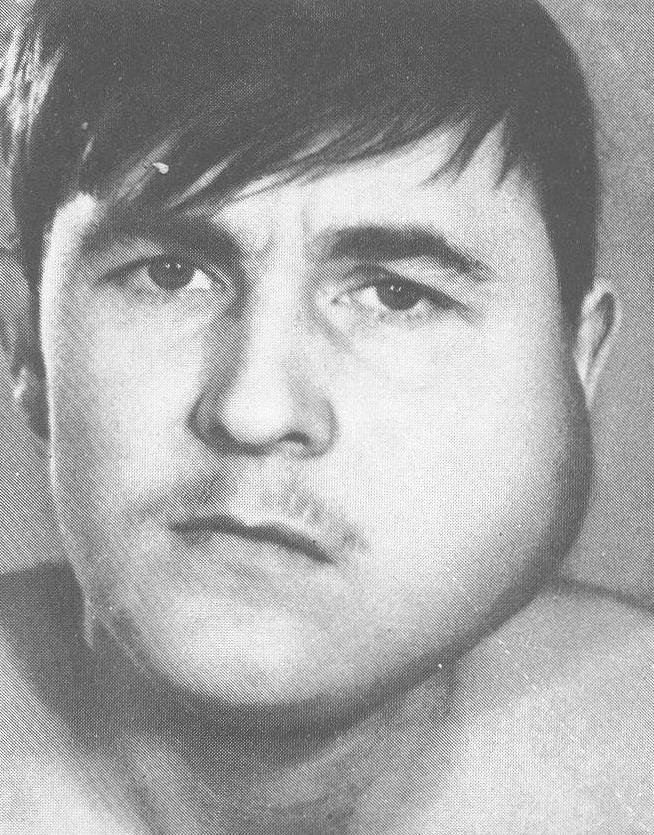
Adamantinoma
Jaw pain can be a symptom of cancer. In the early stages of the disease, symptoms are mild. In this regard, patients mainly turn to doctors at later stages of the disease. If we talk about benign formations, then it can be osteoma, adamantinoma and osteoblastoclastoma. From malignant tumors, sarcoma can be distinguished - a tumor that affects the connective tissue, cancer develops in epithelial tissue and osteogenic sarcomas that affect the bones.
Malignant tumors in the upper jaw are not common, tumors in the lower jaw are more common. They grow rapidly and metastasize to other organs.
If the facial artery becomes inflamed, then there are burning pains that spread up to the chin or nose. Sometimes the pain even radiates to the eye socket. Pathological processes in the carotid artery often provoke migraines that affect half the face, teeth and give into the auricle.
Wisdom teeth
Often the jaw hurts at the time. At the same time, the pain is aching, sharply intensifies when opening the mouth. In this case, it remains only to wait for the completion of the process and apply household painkillers. If discomfort does not allow you to sleep at night and lasts for several days, you need to go to the dentist. He will make a small incision in the gum to make it easier for the tooth to grow. As a rule, after such a procedure, the patient immediately feels much better. If a wisdom tooth has grown into the gum, then it is better to remove it.
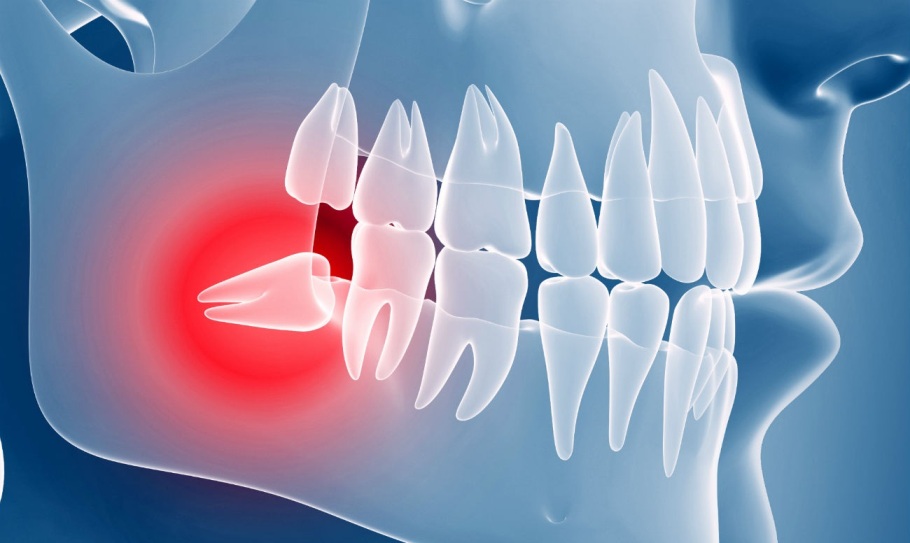
With tolerable pain, you can take a complex pain reliever that will relieve not only pain but also the inflammatory process. You can use tools traditional medicine, for example, rinsing with sage.
Pathology of the temporomandibular joint
There are many diseases that are accompanied by pain in the jaw on the border with the ear. For example, such symptoms are given by arthritis - inflammation in the jaw joint. At the same time, the pain is aching, at night it manifests itself more strongly.
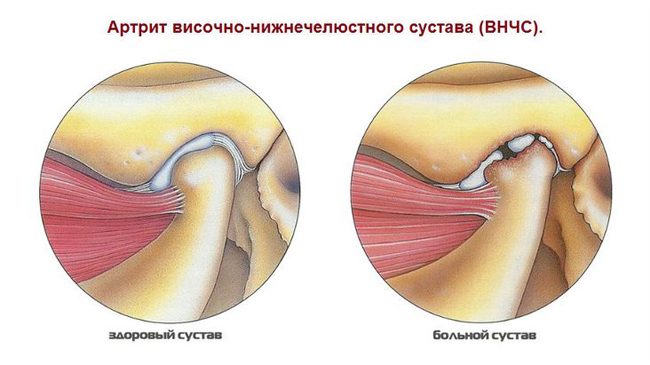
Osteoarthritis is a disease of people of age, the pain in arthrosis increases with exertion, and at rest it becomes weaker. You can determine these diseases by taking an x-ray. If treatment is started on time, then it is quite possible to avoid complications, immobilization of the jaw.
Quite often, people complain that their entire lower jaw hurts.
This condition can occur for various reasons, from diseases in the oral cavity, to severe infection with harmful bacteria.
Therefore, if your front teeth hurt, you need to visit a dentist.
Lower teeth hurt: causes
There are a number of specific signs that will help determine why your entire lower jaw hurts. Thanks to this, you will be able to understand which doctor you need to contact.
Injuries
In order to detect an injury, carefully examine the jaw, check for swelling and bruising. When injured, you will feel pain when pressed.
Localization of pain can be on the right and left, depending on where the injury occurred. After receiving it, saliva may be with a slight admixture of blood.
Infection
Pain in the lower jaw may occur due to the fact that pus has accumulated in the gum. An abscess can be characterized as a small swelling on the mucous membrane in the mouth. If you press your finger on the swelling area, a sharp pain may appear.
Sometimes another sign of infection may appear - swollen lymph nodes. It is for this reason that it is not even the jaw itself that hurts, but rather under it.
A dental abscess may occur due to advanced caries.
Problems associated with the temporomandibular joint
Several of these problems may arise at once:
Rheumatoid arthritis. A slight swelling develops, when you press the gum, pain occurs;
osteoarthritis. The swelling is so strong that a person can hardly open his mouth;
Dislocation of the mandibular joint. The mouth will not close all the way.
Cyst in the lower jaw
A jaw cyst is a small cavity in the bone that is filled with a certain fluid. the main problem in that for a long time The cyst may or may not manifest itself. If it becomes inflamed, there will be pain when chewing, the sore spot will become swollen.
neoplasm
If there is a slight swelling in the jaw area, and it hurts for a long time, this may indicate the development of Barkitt's lymphoma, an osteogenic sarcoma.
Each neoplasm has some nuances, for example, with sarcoma, after some time, the teeth will begin to stagger.
Severe, aching pain in the jaw
Aching pain is a special pain that does not torment as much as acute, but at the same time does not allow you to eat, sleep and do other things calmly. It is unlikely that it will be possible to independently determine the causes of its occurrence, since outwardly there are absolutely no manifestations. Most likely, the specialist will send for an x-ray in order to find out the cause of the condition that has arisen.
Trigeminal neuritis
The trigeminal nerve is the processes that supply the human face with nerve endings. If inflammation occurs in the mandibular branch, then the entire lower jaw will begin to hurt badly.
Regardless of what caused the development of pain, be sure to visit a medical facility to establish accurate diagnosis and receiving treatment.
Lower teeth hurt: first aid
If the lower jaw hurts often and is very noticeable, then this is the first signal that you need to visit a medical facility as soon as possible. First aid is needed in order to get rid of severe discomfort at least for a while, before visiting the dentist.
So, what should be done if the front lower teeth hurt:
1. Apply a cold compress directly to the site of pain. Not completely, but the pain will recede slightly.
2. Rinse your mouth with baking soda as often as possible.
3. If there is clove oil, you can drop it on the aching tooth.
4. Take a small clove of garlic, cut it in half and apply to the sore spot.
5. Mix equal proportions of valerian and calendula tincture, soak a cotton ball in this and apply to the sore spot.
6. Mix a small amount of table salt with ground black pepper, place everything on gauze, apply to the sore gum.
Don't forget pharmaceuticals. But it is worth noting again that the pain can be removed only for a short time, for example, during sleep, then you need to consult a dentist.
Lower teeth hurt: treatment
If your lower teeth hurt, you must definitely look for the cause that affects this.
As soon as the opportunity arises, visit a medical facility. Some patients experience severe pain that just can't handle it, so you can call ambulance.
The specialist should carefully examine the oral cavity, if necessary, you need to take tests. The main treatment measures to eliminate pain in the future:
1. The first thing a specialist should do is relieve pain and muscle spasm. To do this, you need to take painkillers, under the influence of which the muscles will relax. For the same purpose, some dentists inject steroid drugs directly into the jaw joint. The pain subsides, and the swelling (if any) goes away. Symptoms of diseases after such measures may disappear altogether.
2. One more thing good remedy to get rid of pain: hold your mouth open for a while, alternate cold and warm compresses. You can do exercises for the jaw, do not eat too hard food. You want your jaw joint to be completely relaxed, so try not to strain it for a while.
3. In many patients, all lower teeth can hurt even due to stress, which is why it is recommended to undergo special soothing and relaxing therapy.
4. Dentists can prescribe treatment plates specifically for the jaw.
5. Many new retainers can also deal with strong underwear in the lower jaw.
Unpleasant sensations can occur even after surgery, as the bite may be disturbed. In the event of such situations, if no measures help, the doctor may prescribe a second operation.
Jaw injuries
If the front teeth hurt as a result of an injury, you need to call an ambulance. While waiting for the doctor, you need to provide first aid. Try to fix the jaw in one position with a bandage, if there is bleeding, it must be stopped. To do this, you can use a swab or any sterile bandage. If suddenly there is a sinking of the tongue, it must also be fixed without fail. A cold compress is applied to the damaged area. All further actions of the doctor will depend on what exactly happened to the patient.
How to treat infections
The choice of treatment method depends on what kind of infection bothers the patient, at what stage of development it is.
If the disease is acute, treatment will take place in a hospital. First of all, it should apply surgical intervention, purulent foci are processed. Then anti-inflammatory, restorative and stimulating therapy is carried out.
Degree of surgical intervention, choice medicines, physiotherapy, is determined precisely from the characteristics of the disease, as well as from the general condition of the patient's body.
Complex treatment often includes the use of vitamins and also adaptogens.
If the intervention of specialists is timely, then the disease will quickly recede. You can also avoid serious complications.
Lower teeth hurt: prevention
In order to avoid pain in the entire lower jaw, insufficient treatment alone, it is important to follow certain preventive measures that will help avoid the development of many diseases. It includes the following actions:
1. Try not to drink caffeinated drinks, as caffeine can cause muscle tension around the joints.
3. Massage the jaw as often as possible, while also massaging the neck and shoulders.
4. If the pain still bothers you, you can take anti-inflammatory or nonsteroidal drugs, but it is advisable to do this after consulting with your doctor.
5. If there is pain in a child, it is worth paying special attention to this. It is necessary to contact a pediatrician, pediatric surgeon or dentist as soon as possible in order to conduct a complete examination and exclude the development of complications.
6. Particular attention should be paid to oral hygiene. Brush your teeth regularly, do not allow bad teeth in your mouth.
Whatever the pain in the lower jaw, aching or acute, only a dentist can determine the true cause of its occurrence. In this case, all correspondence consultations are simply inappropriate, and may be dangerous to health, since the development of pathology or disease will only get worse. That is why, if you feel that your front teeth hurt a lot, you do not need to self-medicate. By taking painkillers, you will eliminate the pain only for a while, while the true cause will not go anywhere.
Be sure to remember that any discomfort that occurs in the oral cavity: be it acute toothache, bleeding gums, or something else, obliges you to visit a medical facility as soon as possible.
Of course, many patient citizens drink pills and they really manage to get rid of the pain, it seems everything has passed, but in fact it is not.
The longevity of your teeth depends only on you, so do not delay your visit to the doctor! Treat on time, undergo preventive examinations, and then you will be able to please others with your beautiful and healthy smile!
